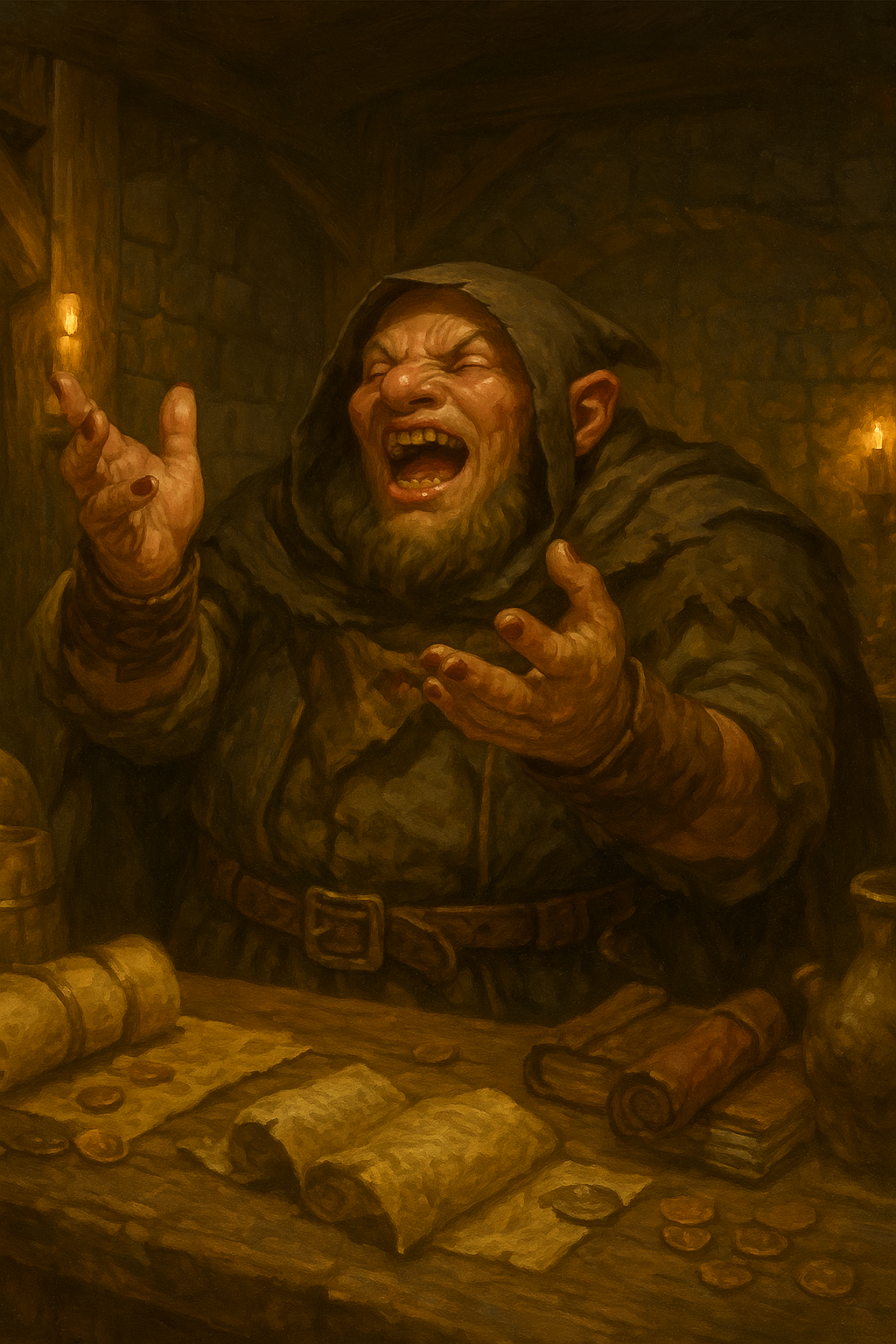When the Story Matters to You — but They’re Just Here for the Fights
This guide is part of Mike’s GM Survival Scrolls.
Start here: When Yer Table’s Crumblin’ and Yer Torch Is Burnin’ Low
The rest o’ the scrolls, in case yer still fightin’ to keep the story alive:
By Elgrin’s Empty Scrollcase, I Should’ve Seen It Comin’
It was a rainy night. The rogue was cryin’. The bard had just confessed he was the villain’s son. The inn was burnin’, the king was dead, and the war drums were thunderin’ on the hills. It was the climax of the whole bloody campaign.
And then the barbarian pipes up: “Can I rage now?”
Lad, I ain’t sayin’ I quit the table. I’m sayin’ I left the room, stared into me own tankard for ten minutes, and seriously considered usin’ it as a flail.
This is the quiet death of many a good campaign. You pour yer heart into a tale of loss, redemption, and broken crowns… and half the table’s just countin’ how many goblins they’ve cleaved this arc. Yer sittin’ on a tale worth singin’ in halls of stone, and they treat it like a dungeon-delvin’ dice-chucker.
So what do ya do when yer players treat story like filler between brawls?
If They Want a Bloodbath and You Want a Ballad, You’re Gonna Get a Mess
👉 Visit the GM Wisdom archive to figure out how to turn narrative lovers and dice slingers into one table, or reach out to me direct through the contact page before yer bard has another breakdown nobody respects.
Why the Disconnect Hurts So Damn Much
It ain’t just about taste. It’s about investment. When yer players skip past every monologue and NPC scene just to ask, “How much HP does he have?”, it feels like they’re pissin’ on yer blueprints.
But here’s the twist, lad — they might not even know they’re doin’ it.
Some reasons why:
They’re nervous. Story scenes feel like improv. Fights feel like rules. They hide in numbers.
They don’t know how. Nobody ever taught them how to roleplay grief, or love, or doubt.
They’re used to dungeon crawls. To them, this is filler. They’ve only seen one kind of game.
They’re tryin’ to be funny. They panic when things get too real, and out comes the jokes.
Now don’t go callin’ ‘em fools just yet (unless they’ve earned it). Yer job ain’t to convert ‘em. It’s to build a bridge.
How to Win Them Over Without Forcin’ It
1. Use Story to Fuel Combat
Don’t separate the two. Make the fights matter.
That bandit ain’t just a stat block. He’s the rogue’s old cellmate.
That dragon ain’t just treasure. It’s the sorcerer’s kin.
Build meaning into battle — and the story-lovers and brawlers’ll both lean forward.
2. Make the Consequences Personal
Let player choices ripple. Did they spare the villain? He returns — stronger. Did they ignore the old woman in the woods? Her curse now rides the fighter’s blade.
Even the fight-happy ones’ll notice when their actions have echoes.
3. Highlight Character Growth Mid-Fight
Let the wizard hesitate before killin’ her mentor. Let the paladin cry out when his vow’s tested in the thick of it. Insert micro-beats in combat. Show ‘em it ain’t just about hit points.
And if they roll their eyes? Fine. Let ‘em roll. Keep doin’ it. Like dwarven tunneling — eventually, the story will crack their armor.
When It Still Don’t Land
Some folk just don’t want it. And that’s fine. But if you’re runnin’ a game that’s startin’ to fall apart because you’re tellin’ a tale and they’re playin’ Diablo, then it’s time to have a talk.
Tell ‘em yer goals. Ask for theirs. See if there’s overlap. If not? Time to pivot. Or part ways clean.
And if you’ve tried, truly tried, and you’re still feelin’ like the only one at the table who cares? You might also find some solace in this one: When Nobody Prepares But You.
You ain’t alone, lad. Plenty of us have sung stories to empty halls.
You Deserve to Tell a Tale Worth Telling
👉 Come back to the About Mike’s Tavern to remember why we built this place — for folk who love stories and swords. Or tap back into the GM Wisdom archive for tips on balancing both without losin’ yer mind.
⚠️ And if one more player skips a character moment to loot the corpse of a villain they just kissed, I swear by Margann’s crusty beard, I will ban romance arcs for a year.
FAQ
Q: Is it wrong for players to only like combat?
A: Nah, lad. But if they trample yer story for the next fight, then it’s a problem. It’s about balance, not blame.
Q: Should I stop writing dramatic scenes?
A: Only if ye want to. Don’t snuff yer torch just ‘cause others can’t see by it yet.
Q: What if one player loves the story, and the rest don’t?
A: Spotlight ‘em. Feed their arc in ways that enrich the party. Eventually, others’ll lean in — curiosity’s contagious.


